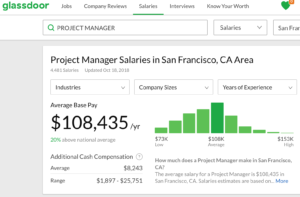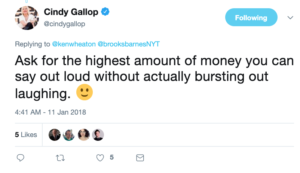Hey there! This post contains affiliate links. Using my links means I earn a commission, which helps me create more rad content. More on affiliates here.
This post was originally part of a “30 Blog Posts in 30 Days” challenge I did with some of my clients, and it has been updated!
Okay, so, y’all know I’m a Business Gay™. Basically, this means that while I think Late Stage Capitalism is a steaming pile of horse manure, I also know that money buys shit like medications and renter’s insurance. Ergo, it’s in my radical queer friends best interest to get paid. Here’s a blog post on negotiating your salary when you’re squeamish about money existing in the first place.
If you need help with your resume, career coaching or salary negotiation, let’s set up a chat.
[Heads up! This post uses affiliate links, and you help me earn $$ when you use my links. More on affiliate links here!]
Let’s Talk about Your “Money Feels”
So, here are a few things to keep in mind before we get started:
-
- Making money doesn’t make you a bad person. Money just is.
- Money is ENERGY. I’m not interested in going back to the barter system, as I don’t want to figure out how many dresses I need to trade for groceries. Like, is one bodycon dress equivalent to half a dozen eggs, or is it more inline with 1/2 a lb of brussel sprouts?
- While our current system around money needs some work, the existence of money is helpful
-
- Making more money means you can donate more money to causes you care about and put money away for a rainy day.
- “It is what it is.” While we do the longterm work of making the world a more equitable place, refusing to engage with how the world currently is now, in this moment, hurts you, and benefits those in power (/those paying you).
If you need some help tackling your feels around money, I suggest this book, “You Are a Badass at Making Money,” below:
MAKING SURE YOU’RE GETTING PAID EQUITABLY IS RADICAL AF

1. Do Your Research
The first step to any negotiation is to know your numbers. Get on Google, and type in “[job name] salary [city].” A lot of times, industry publications (or bloggers, activists, etc) will have compiled research on the salary statistics.
Some industries also have ~social media champions~, people who have compiled google docs of anonymous data for certain types of positions. This mostly exists in tech, but it wouldn’t hurt you to search Twitter to see if someone has compiled research on salaries for your job type exists!
The easiest place to check is on a website like Glassdoor, where you can look up salary information by city and job type. You may have to try a few different names for the work you do. (Ex: “Social Media Specialist” and “Social Media Marketer”)

Seeing the salary range for different cities can make you feel glum, but remember that the cost of living has a real impact on salary. To learn more about what goes into determining a number for a salary, check out this post.
Oftentimes, queer and LGBT folks looking for a job find that they’ve lowballed yourself – especially if you work at a non-profit. But knowledge is power y’all! You have market rates for your role, which is going to make negotiating your salary much easier.
Key Takeaway: The first step to any negotiation is to know your numbers.
2. Factor in Stock Options, Hiring Bonuses and Healthcare Costs
When it comes to stock options, that’s a whooooole other story, where you’ll probably want to a hire a ~Professional Financial Advisor~ for a few hours. GURL, if you are dealing with options, DROP THE CASH AND TALK TO SOMEONE WHO KNOWS. Not your fave work friends, not your mom (unless she’s a financial advisor), and not me. Stock options are NOT TO PLAYED WITH.

Healthcare
Healthcare is such a variable cost, and sometimes it may be better to go with a lower salary for better health coverage. For instance, if your current deductible on your insurance is $1,000 and your new deductible is $7,000 – well, it looks like you’re not getting quite the jump in pay you thought!
When negotiating, ask the hiring manager/HR rep to send over the insurance options for the position. Looking at your healthcare costs for the last year, estimate how much you’ll pay on this plan.
Hiring Bonuses
For bonuses, keep in mind that you won’t get a check for the total bonus amount. Generally, taxes take anywhere from 30–50% of a bonus paycheck, depending on your state/country.
Oh, ALSO. If you’re moving cities — you must research cost of living. I like the NerdWallet calculator for this. It looks at comparing costs between your current locale and the city you’re moving to. Money does NOT spend the same in different cities.

3. Know Your Number
Before entering into negotiations on your salary, be sure you have a firm number. I like to have 3:
- Lowest Acceptable Salary: This is pretty self-explanatory. After looking at expenses and your current take-home pay, this new number is the lowest salary you will accept. OVERALL, unless a cient *really really* wants a position, I don’t let them go this low. As you change roles and grow your queer career, you should be making 10-15% more MINIMUM at a new job.
- Market Rate + 20%: Pretty self-explanatory! Use that GlassDoor research to your advantage.
- Badass MoFo Rate: This is a tried and true method, but it’s not for the faint of heart. Cindy Gallop (badass business woman) advises people in marginalized groups to “Say the highest number you can without laughing.” No, I’m not telling you to say that your salary is $1 Billion dollars per year, rather, I’m challenging you to think big. What is the absolute most you could make in this role? There’s your #.
4. The Actual Negotiation
Okay, so in a few niche industries (like NGOs), the org won’t negotiate your salary. Their first offer is their final offer. Before entering negotiations, do some research online to figure out if they only give one offer.
But, for most companies/orgs/entities, they will always lowball you on the initial offer.

For instance, if a company expects to pay a candidate $50K a year, they’ll offer somewhere in the $42K neighborhood. The biggest mistake I see candidates make is saying, “Oh, well I can totally live on that. I’m just gonna take it.”And their future employer is stoked, because they just got a deal.
You are not a flash-sale, and you are no one’s “deal.” Always counter offer, and try to do this over email as opposed to the phone. We’re socialized to be agreeable/positive in-person, and sticking up for you/your salary is much harder when you’re on a phone call.
Appreciate this article? Please share it!! Want more content like this? Join my email list for regular ass-kicking, or hang on Twitter if you’re not ready for a LTR.
Disclaimer: This is from my experience. I’m not a lawyer or a licensed accountant. Please make business decisions with licensed professionals.














